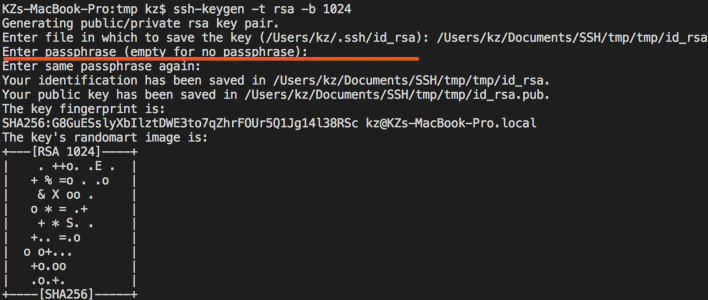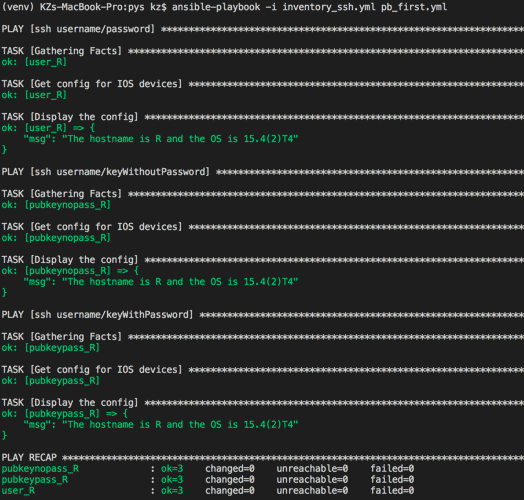After Telnet, continue to discuss how to access network device via SSH with Ansible.
For SSH access, we should consider 3 methods:
- Username/password
- Username/Public-Key without password
- Username/Public-Key with password
Same EVE lab as the Telnet one: The Cisco IOS Router-192.168.1.99 is for SSH
Enable SSH on the router
Jump #1 username/password part to public key configuration, I discussed how to configure public key on IOS router with Putty before, instead of windows/putty, openssh is useful for generating keys on MAC OS.
Considering Cisco IOS device support RSA key only, I generate keys by the command:
ssh-keygen -t rsa -b 1024
Keep passphrase empty is for Case#2.
Configuration for SSH access
Because I run all the 3 cases on the same one device, here the points I must care:
Share SSH Sessions
The name of the feature of Ansible should be ‘Cache Connections’, refer to the description in the issue: ansible is caching connections?: Ansible itself does not cache connections, but if you ssh is new enough it will be using control master/persist which allows ssh itself to cache connections, you can disable this by overriding ssh args in ansible.cfg or switching to paramiko as a transport. (Here is a demo about how Putty supports it)
From my understanding, it will compare the fingerprint of the host to see whether it’s a known host or not For sake of methods testing, I configured secondary IPs (192.168.1.98, 192.168.1.97) and named the IP different names, disabled Host Key Checking.
new inventory: inventory_ssh.yml
---
user:
hosts:
user_R:
ansible_host: "192.168.1.97"
vars:
ansible_network_os: "ios"
ansible_ssh_user: test
ansible_ssh_pass: test123
pubkeynopass:
hosts:
pubkeynopass_R:
ansible_host: "192.168.1.98"
vars:
ansible_network_os: "ios"
ansible_ssh_user: sshpubkey
ansible_ssh_private_key_file: '/Users/kz/Documents/SSH/tmp/id_rsa_nokey'
pubkeypass:
hosts:
pubkeypass_R:
ansible_host: "192.168.1.99"
vars:
ansible_network_os: "ios"
ansible_ssh_user: sshpubkeypass
ansible_ssh_private_key_file: /Users/kz/Documents/SSH/tmp/id_rsa_pass
ansible_ssh_pass: test123
Note: For the public key with password case, instead of SSH password, ‘ansible_ssh_pass’ is for the key’s password.
New playbook: pb_first.yml
---
- name: ssh username/password
connection: network_cli
hosts: user
become_method: enable
tasks:
- name: Get config for IOS devices
ios_facts:
gather_subset: all
- name: Display the config
debug:
msg: "The hostname is {{ ansible_net_hostname }} and the OS is {{ ansible_net_version }}"
- name: ssh username/keyWithoutPassword
connection: network_cli
hosts: pubkeynopass
become_method: enable
tasks:
- name: Get config for IOS devices
ios_facts:
gather_subset: all
- name: Display the config
debug:
msg: "The hostname is {{ ansible_net_hostname }} and the OS is {{ ansible_net_version }}"
- name: ssh username/keyWithPassword
connection: network_cli
hosts: pubkeypass
become_method: enable
tasks:
- name: Get config for IOS devices
ios_facts:
gather_subset: all
- name: Display the config
debug:
msg: "The hostname is {{ ansible_net_hostname }} and the OS is {{ ansible_net_version }}"
Run playbook
Run the playbook by executing the command:
ansible-playbook -i inventory_ssh.yml pb_first.yml
How to verify?
From the inventory file, you can see that I use different users for different methods, you can run ‘show users’ command on the IOS router to see if device was accessed by different users:
*** End ***
Reference:
https://www.ssh.com/ssh/keygen/
How to generate the keys
https://medium.com/openinfo/ansible-ssh-private-public-keys-and-agent-setup-19c50b69c8c
How to run SSH with SSH-add as ansible recommended: Ansible does not expose a channel to allow communication between the user and the ssh process to accept a password manually to decrypt an ssh key when using the ssh connection plugin (which is the default). The use of ssh-agent is highly recommended.
https://gist.github.com/yaegashi/9660f147cc8a5dfff339
A sample reminds me that ansible_ssh_pass should work for the key.
The output of Ansible cache connections error:
PLAY [ssh username/password] ************************************************************************************************************************** TASK [Gathering Facts] ******************************************************************************************************************************** task path: /Users/kz/Documents/C/ansibleprj/pys/pb_first.yml:3 The full traceback is: Traceback (most recent call last): File "/Users/kz/Documents/C/ansibleprj/venv/lib/python3.7/site-packages/ansible/plugins/connection/paramiko_ssh.py", line 352, in _connect_uncached **sock_kwarg File "/Users/kz/Documents/C/ansibleprj/venv/lib/python3.7/site-packages/paramiko/client.py", line 424, in connect passphrase, File "/Users/kz/Documents/C/ansibleprj/venv/lib/python3.7/site-packages/paramiko/client.py", line 714, in _auth raise saved_exception File "/Users/kz/Documents/C/ansibleprj/venv/lib/python3.7/site-packages/paramiko/client.py", line 701, in _auth self._transport.auth_password(username, password) File "/Users/kz/Documents/C/ansibleprj/venv/lib/python3.7/site-packages/paramiko/transport.py", line 1381, in auth_password return self.auth_handler.wait_for_response(my_event) File "/Users/kz/Documents/C/ansibleprj/venv/lib/python3.7/site-packages/paramiko/auth_handler.py", line 212, in wait_for_response raise e paramiko.ssh_exception.AuthenticationException: Authentication failed. During handling of the above exception, another exception occurred: Traceback (most recent call last): File "/Users/kz/Documents/C/ansibleprj/venv/bin/ansible-connection", line 105, in start self.connection._connect() File "/Users/kz/Documents/C/ansibleprj/venv/lib/python3.7/site-packages/ansible/plugins/connection/network_cli.py", line 298, in _connect ssh = self.paramiko_conn._connect() File "/Users/kz/Documents/C/ansibleprj/venv/lib/python3.7/site-packages/ansible/plugins/connection/paramiko_ssh.py", line 249, in _connect self.ssh = SSH_CONNECTION_CACHE[cache_key] = self._connect_uncached() File "/Users/kz/Documents/C/ansibleprj/venv/lib/python3.7/site-packages/ansible/plugins/connection/paramiko_ssh.py", line 365, in _connect_uncached raise AnsibleConnectionFailure(msg) ansible.errors.AnsibleConnectionFailure: Authentication failed. fatal: [user_r]: FAILED! => { "msg": "Authentication failed." }
Scan the QR code using WeChat





